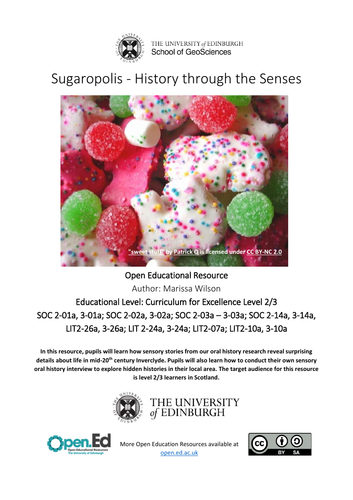







In this resource, pupils will learn how sensory stories from our oral history research reveal surprising details about life in mid-20th century Inverclyde. Pupils will also learn how to conduct their own sensory oral history interview to explore hidden histories in their local area.
Teachers and pupils can explore the role of sugar in shaping the history of Greenock and then conduct their own interviews to find out about the history of their local area – focusing on sights, smells, sounds and taste. Students can use objects and questions about the senses creatively to discover what life in their town was like in the past and compare this with other knowledge of the same historical period.
While this resource was originally designed for primary and secondary school children in Inverclyde to share local stories of Greenock’s sugar industry, it could easily be adapted to another area with an industrial past that could be explored using the same methods. This resource is also designed to be adaptable for students from P5 up to S3 classes (ages 10-15 years).
This resource bundle includes pdf and editable versions of the following:
• A PowerPoint presentation about Sensory Oral Histories (within the context of the sugar industry in Greenock)
• Teacher’s guide, including a lesson plan on Sensory Oral History interviews (an overview and practise outline)
• Student information sheet
• Student worksheet for interview practise
• An interviewee consent form
Learning Outcomes in the Curriculum for Excellence:
Social studies - SOC 2/3-01a; SOC 2/3-02a; SOC 2/3-03a; SOC 2/3-14a
• Develop my understanding of the history, heritage and culture of Scotland, and an appreciation of my local and national heritage within the world
• Learn how to locate, explore and link periods, people and events in time and place
• Learn how to locate, explore and link features and places locally and further afield
• Explore and evaluate different types of sources and evidence
Literacy & English - LIT2/3-26a; LIT 2/3-24a; LIT2-07a; LIT2/3-10a
Students will research local and global history by conducting sensory oral history interviews, applying their skills and understanding in a range of contexts and suitable formats. The writing format of the piece of text, accompanying historical materials, level of challenge, length and complexity of task are to be determined by the teacher.
This resource was created by Marisa Wilson and adapted by Amy Cook at The University of Edinburgh. Unless otherwise stated, all content is released under a CC BY-SA 4.0 license.
Something went wrong, please try again later.
This resource hasn't been reviewed yet
To ensure quality for our reviews, only customers who have downloaded this resource can review it
Report this resourceto let us know if it violates our terms and conditions.
Our customer service team will review your report and will be in touch.